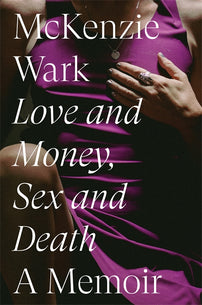Love and Money, Sex and Death: a Letter from the Editor
"There is a quiet, but fierce, revolution in these pages."—Leo Hollis

I have worked with McKenzie for 10 years. We first worked together on Molecular Red, that applies critical theory to the ecological debate. I had always though that McKenzie was one of the most acute reader and explainer of philosophy and contemporary thinking, and in her next books, General Intellect and Sensoria, she gave a comprehensible introduction to the intellectual frontiers of her time. Capitalism is Dead revisited the ideas of her first book The Hacker Manifesto, and retraced the desiccated digital landscape.
At this time her writing was taking a new direction too. Philosophy for Spiders is a memoir of a relationship with Kathy Acker, Reverse Cowgirl explores modes of autofiction. Raving reveals the euphoria of letting go in difficult times. But I never knew that she would write a book like this. Love and Money, Sex and Death is a major literary work - perhaps the most moving and insightful account of transition I have ever encountered. This is different, and not just because of the quality of the writing.
It was only at 58 years old, married, with two children and a twenty-year teaching career at the New School that McKenzie transitioned. Such a late life change is very rare. But for a person who has spent a life thinking profoundly about philosophy, politics, life, this transformed everything. No more so that memory itself - who was she when she was a child, a son, a boyfriend, a husband and father. She held those memories dear because they were what and who she was, but it was also someone else in those memories.
So she started on a course of writing - putting down a series of letters to her mother, sister, first girlfriend, wife, trying to weave the past and present together. In the book she also charts her new life - of her divorce but continuing close relationship with her family, of going clubbing, of being on the front line of activism. And of making peace with the awkward, spotty teenage boy she once was.
It is, in the end, a celebration of love in all its forms:
One just has to love without expectations. Just give in without hope, and then love will be without fear. Love’s no bargain. There’s no exchange, no transaction, with the world. One just tries and fails to give. One just trusts in a capacity to exceed oneself and open oneself, to go, to let go. In love, there’s no happy endings. Only the memory of moments when what can be—was.
One thing that strikes me about this long after I have read it, is that it is not the debates on trans that linger, rather it is a book about finding solidarity – a family, home, a community, and making sense of these shifting constellations. As McKenzie wrote in Time recently: ‘In the end, you really have to wonder what all the fuss is about. Perhaps it’s that bodies are complicated and can get weird.’ And this is where we find a politics that is nurturing and generative: ‘That being human, even at its most ordinary, is also variable. That if you want to really see us, this variability is something to celebrate, rather than merely tolerate, or at worst, repress.’
And it is this generosity (one that is unique to the best kind of literature) that shines through. This is why this book has already gathered a family around it. We have sunning quotes from Susan Styker, Chris Kraus, Mattilda Bernstein Sycamore, Sophie Cunningham and Fiona Kelly McGregor. Kraus notes: ‘I was inspired and energized reading this book.’ And that seems so true.
As with all great literature, in the end, the proof is in the reading. There is a quiet, but fierce, revolution in these pages.
Leo Hollis, Editorial Director
London, August 2023
Love and Money, Sex and Death by McKenzie Wark is one of our September Verso Book Club reading selections! See more about the Verso Book Club here.
[book-strip index="1" style="buy"]
